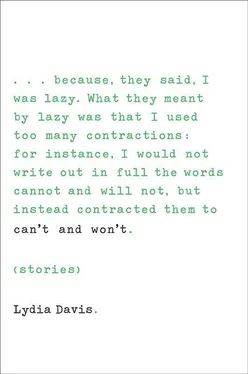* * *
Trenton Makes, the World Takes — out the window. How many advertising slogans will I stare at out the window today? Now there are poles falling over into the water with all their wires still strung on them — what happened to them, and why were they left there?
It’s always the ones without families who get asked to work on this day. I could have claimed that I was spending it with my brother, but he’s in Mexico.
Four hours, a little more. I’ll be there around dinnertime. I’ll eat in the hotel restaurant, if there is one. That’s always the easiest. The food is never really very good, but the people are friendly. They have to be, it’s part of their job. Friendly sometimes meaning they’ll turn the music down for me. Or they’ll say they can’t, but smile.
* * *
Was a love of animals something we shared? She must have liked them or she wouldn’t have sent me those presents. I can’t remember how she was with animals. I try to remember her different moods: so often worried, sometimes more relaxed and smiling (at the table, after a drink of wine), sometimes laughing at a joke, sometimes playful (years ago, with her children), at those times filled with sudden physical energy, lunging at someone across the lawn, under the bay tree, in the walled garden that her husband cared for so patiently.
She worried about so many things. She would imagine a bad outcome and she would elaborate on it until it grew into a story and moved far away from where it started. It could start with a prediction of rain. To one of her grown daughters, she might say something like It’s going to rain. Don’t forget your raincoat. If you get wet you might catch cold, and then you might miss the performance tomorrow. That would be too bad. Bill would be so disappointed. He’s looking forward to hearing what you think of the play. You and he have talked about it so much …
I think about that a lot — how tense she was. It’s something that must have started very early, she had such a complicated childhood. Three fathers by the time she was six years old — or two, I suppose, if you don’t count her actual father. He knew her only when she was a baby. Our mother kept leaving her with other people — a nanny, a cousin. For a morning or a day, usually, but once, at least, for weeks and weeks. Our mother had to work — it was always for a good reason.
I didn’t see her often, a long time would go by, because she lived so far away. When we saw each other again, she would put her arms around me and give me a strong hug, pressing me against her soft chest, my cheek against her shoulder. She was half a head taller, and she was broader. I was not only younger, but smaller. She had been there as long as I could remember. I always felt she would protect me or look out for me, even when I was grown up. I still sometimes think, with a pang of longing, before I realize what I’m thinking, that some older woman I see somewhere, about fourteen years older, will take care of me. When she drew back from hugging me, she would be looking off to the side or over my head. She seemed to be thinking of something else. Then, when her eyes rested on me, I wasn’t sure she saw me. I didn’t know what her feelings for me really were.
What was my place in her life? I sometimes thought that to her daughters, and even to her, I didn’t matter. The sensation would come over me suddenly, an emptiness, as if I didn’t even exist. There were just the three of them, her two girls and her, after their father died, after her second husband left. I was peripheral, our brother was, too, though he and I had been such a large part of her life early on.
I was never sure how she felt about anyone except her daughters. I could tell how much she missed them, when they were away, because she would suddenly become so quiet. Or when they were about to go away — from the rented house at the beach, saying goodbye on the front doorstep, the shiny dune grass growing in the sand beyond the cars, the gray shingle of the roof in the sun, the smell of fish and creosote, the sun reflecting off the cars, then the slam of one car door, the slam of the other car door, and her silence as she watched. It was when she was quiet that I felt I had more access to the truth of her feelings, a way to see into them, and those times were mostly in relation to her daughters.
But I think her feelings about our mother were a heavy burden in her life, at least when they were together. When our mother was far away, maybe she could forget her. Our mother was always stepping on her to get up higher, always needing to be right, always needing to be better than her, and than all of us, most of the time. The terrible innocence of our mother, too, as she did that. She had no idea, most of the time.
* * *
Our last conversation — it was on the phone, long-distance. She said she was having trouble seeing things on the right side of her field of vision. On a form she was filling out, she saw the word date and wrote in the day’s date, not seeing that there were more words to the right of it, and that she was supposed to fill in date of birth. We talked for a while, and towards the end of the conversation, I must have said something about talking again in a few days, or staying in touch about her condition, because then, in answer to that, she said she didn’t want to talk again, because she wanted to save all her strength for talking to her daughters. As she said it, her voice sounded to me distant, or exhausted, she did not soften what she was saying, or apologize. We never talked again after that. I felt pushed away, pushed out of her life. But her coolness was the sound of her own fear, her preoccupation with what was happening to her, not anything against me.
After she died, I kept going over and over it, trying to see what she felt about me, trying to measure it, find the affection or the love, measure that, make sure of it. She must have had mixed feelings about me, her much younger sister — my life at home was easier than hers had ever been. She probably felt some jealousy that went on and on, year after year, and yet she did want to be with me, she came to where I lived, she visited me, she slept in my living room, it was two nights, at least. She came more than once. Was it on one of those visits that I heard her little radio going half the night, close beside her next to the bed, muttering and singing, or was it in one of the rented beach places during the summer vacation, sand on the floor, someone else’s furniture, someone else’s art on the walls? She had trouble sleeping, she kept the radio on and read a detective novel late into the night.
And she did have me come and stay with her, and once I lived with her for a while, when I had to get away from my parents. Sometimes I thought she took me in from a sense of duty to me, her younger sister, since I was always having my own problems.
* * *
She always sent our package well ahead of time. Inside, each present was wrapped in soft tissue paper, or stiffer wrapping paper. All these presents — she picked them out, bought them, wrapped them in cheerful paper, labeled them in her large script with black or colored marker directly on the gift wrap, and sent them a couple of weeks in advance.
I know I always cared too much about my presents. This holiday was the high point of the year for me when I was a child, and that has never changed. The year culminates in this holiday and the turning of the old year to the new year, and then the circle of the year begins again, always leading up to this holiday.
The seagull ended up in a closet, the strings tangled. From time to time, I would try to untangle it, and at last I succeeded. Then I hung it from a rafter in the barn with a piece of duct tape. After a while, in the heat of the summer, the tape loosened and it fell down.
Читать дальше












